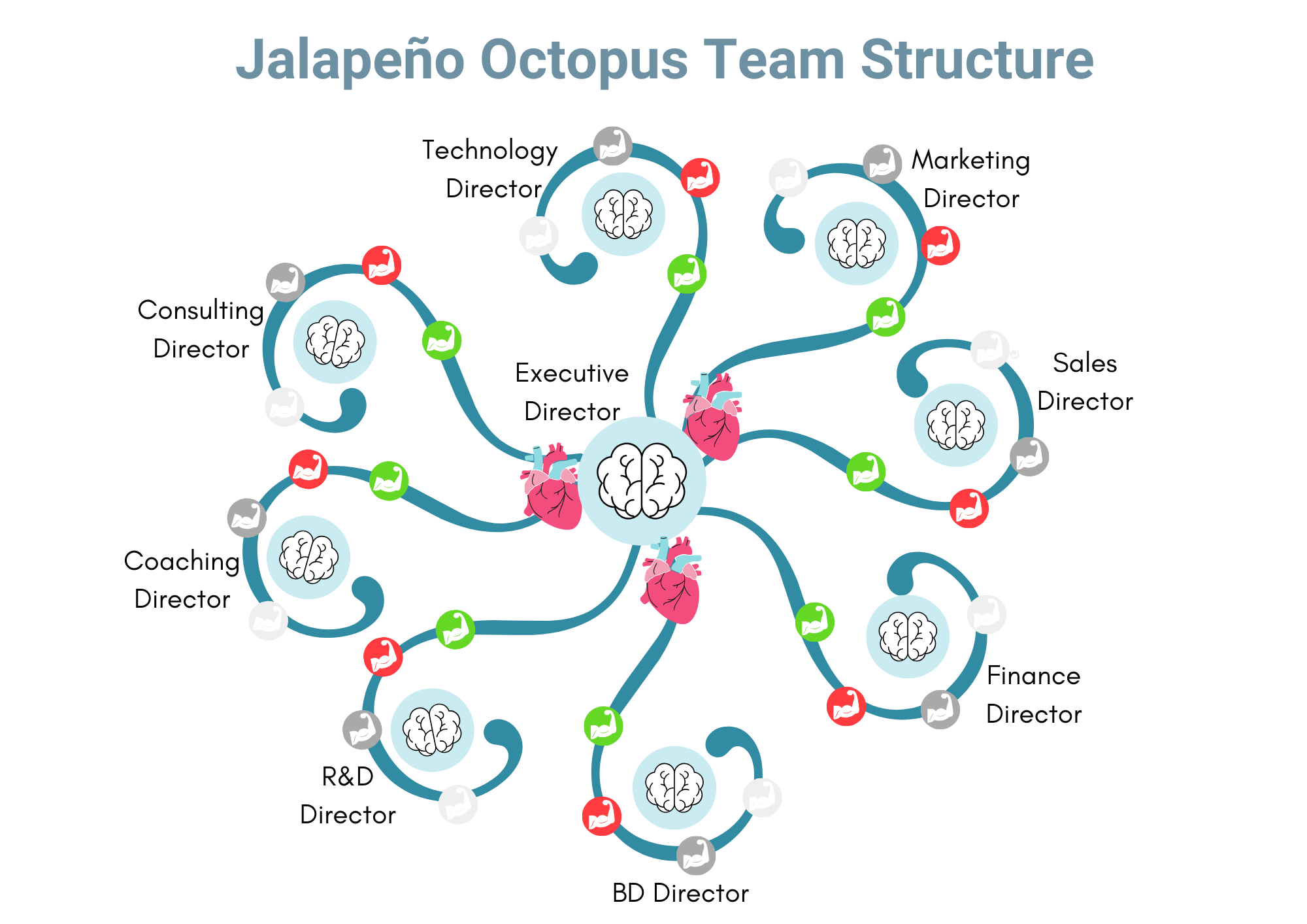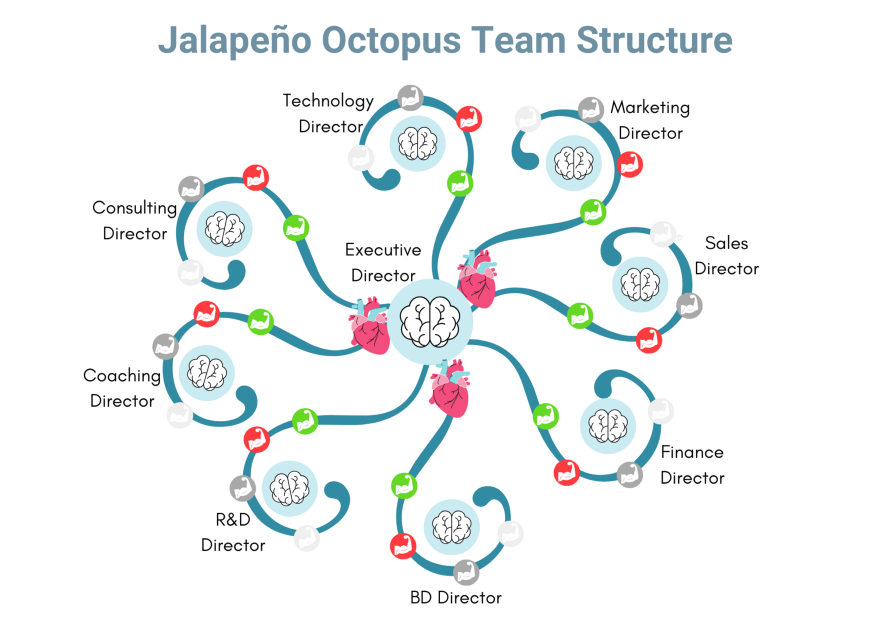
Samin Saadat
Executive Director

Samin Saadat
Executive Director

Ever since the COVID-19 crisis hit us, the demand for leadership and people management has been growing rapidly. Now more than ever, companies need additional support to manage their team, whether that support is for restructuring, downsizing, or increasing well-being and accountability. I was impressed by how everyone in our team took ownership of their roles and adapted to the market so quickly! Now that we are also growing, I was thinking… how can I make sure to scale the adaptability, ownership and intelligence within the team? What type of team structure would allow us to meet our long term vision? What type of team structure would allow us to adapt quickly, even as a large organization? Although we offer this support to our community on a daily basis, I could not align any of the existing team structures to match the Jalapeño team and vision, until one very special interaction…
I was having a conversation with Seb Taylor, founder of Octopus Analytics, and I was curious as to why he chose that name for his company. “Octopuses are incredibly smart, and have 9 brains that can work independently, much like the systems in a business,” he said, which made me even more curious to learn about them. I spent almost a full day learning about octopuses after our conversation when I realized this is exactly how we should model our own team structure — an independent and interdependent team, working autonomously with high agility and adaptability! This is the secret sauce of Jalapeño!

An octopus has 9 brains: There is one brain in the centre and each of its eight legs consists of its own brain. While the central brain controls the nervous system, each leg’s brain controls its own movement which is aligned with the central nervous system. Also, each leg is fully equipped with all the senses, such as smell and taste, and can feel and move independently.
Jalapeño has 9 brains: We have one central department, which is owned by the Executive Director (me), and eight other departments that are each owned by their own director. The directors, ie. “brains”, make decisions independently that are aligned with the overall vision of the centre, and have a wide range of diverse skills in their team to function independently.
An octopus does not have skeletal support: An octopus’s body consists of different types of muscles, such as longitudinal, transverse and circular muscles, that allow them to extend, contract, twist, bend in any direction or be held rigid.
Jalapeño does not have a skeletal support: We ensure that every team has a diverse range of team members that will allow the team to pivot and move in any direction or stay rigid, depending on their environment, market needs, vision and creativity.
An octopus has 3 hearts: Considering their bodies are all muscle except for two small places anchoring their heads, it is critical to have two hearts to pump blood to the gills and a larger heart that circulates blood to the rest of the body. This ensures its muscles and brains get enough nutrients to fully function.
Jalapeño has 3 hearts: Considering team members are the most valuable assets of the company, we have three roles dedicated to taking care of our people while they take care of the business. The “hearts” ensure everyone in the team has all the right skills, mindset, and environment to flourish. They work closely with team members and leads, empowering them to engage themselves and their team to increase productivity and individuals’ well-being. In other words, similar to how Jalapeño functions as the “heart” for our clients, we need to make sure our own team gets enough nutrient-rich blood to fully function too.
An octopus camouflages in a second to match its environment: An octopus can change colour and texture to camouflage themselves in the blink of an eye — some can even change shape to protect themselves from predators.
Jalapeño changes color and shape quickly to adapt: This crisis is a great example of how our team completely changed our structure, products, and services in less than a week to adapt to the new market. For example, before the crisis we were working on Performance Evaluation & Feedback, Transformative Leadership Style, Growth Strategy and Employer Branding. Once the crisis hit, I was impressed by how the team re-assessed clients’ needs right away and transformed all products and services to Remote Working, Crisis Management, Downsizing and Psychological Safety. It was fascinating to see how the team took full ownership of their roles, as well as communicated and changed roles to meet the new needs of clients!
Octopi are fast learners and problem solvers: Octopuses are so smart that they can learn from observing, solve puzzles, and even use tools to protect themselves and solve problems. They remember past events to navigate mazes, and have high awareness of themselves and their environment. They always observe and explore the problem before starting to solve it, and they know exactly what their capacities are! Thus, if they cannot save themselves or solve the problem, they think of other ways that are within their capacities before putting themselves into trouble!
We are fast learners and real problem solvers: Here at Jalapeño we spend a significant amount of time defining the problem first before coming up with a solution. We have clear awareness and understanding of our existing capacities, and we find solutions that are long-term by leveraging the right tools and resources, allowing us to generate high ROI for ourselves and our clients.
An octopus is transparent with its feelings: Octopuses change colours based on their feelings. For example, they will turn red if they are angry!
We are transparent with who we are and how we feel: We here at Jalapeño feel safe and comfortable to be who we are and share our thoughts, without being judged or criticized! We admire those who share their tears of joy and sadness with us!
An octopus dies after its eggs hatch: Female octopuses live with their eggs for seven months without eating, ensuring that streams of oxygen and nutrient-rich water reach their eggs. However, once the eggs hatch, the female body self-destructs its cells until it dies.
We plan and take care of our successors: Although the ultimate sacrifice of female octopuses sounds very tragic, it gives us valuable insight! One day in the future, we know we have to step out and let new “brains” and “muscles” run and grow the business. We know how important it is to make sure we pass on the right skills and knowledge to succeeding generations to ensure that Jalapeno stays alive; therefore, we take a proactive approach to ensure every role has a successor and we enrich the “eggs” until they hatch!
An octopus has a toxic inc to protect itself from predators: Octopuses have glands that produce toxic inc — when an octopus is alarmed, it squirts its ink to confuse and paralyze the potential threat while fleeing to safety. This inc is deadly, even for the octopus itself, and it can block any fish gills.
Jalapeño has a plan to protect itself from potential threats: In our team, we always assess the threat of a situation and take a proactive approach to either turn the threat into an opportunity for growth or fly away from it. We also understand that we have to be very careful with our approach since, like the octopus, our “inc” can kill us too!
The human brain, behaviour and interactions with their environment never fail to intrigue Samin Saadat . After spending long hours in psychology labs at UBC and completing her Masters at the Sauder School of Business, she entered the workforce and observed a gap between what research suggests and what companies actually do to increase productivity and profitability. Now, Samin is on a mission to bridge this gap through Jalapeño Employee Engagement — leveraging technology and professional human services to bring research findings to life to help companies save invaluable dollars and to help individuals enhance their quality of life.